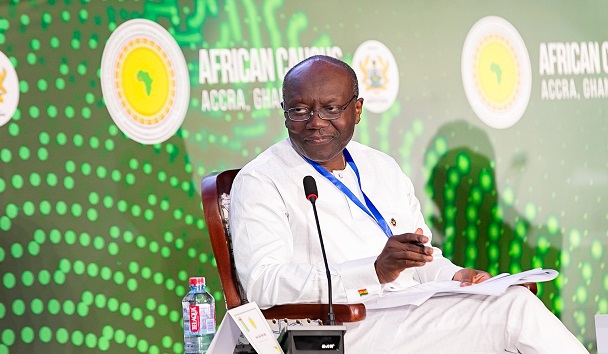
African Governors at the end of a two-day meeting have committed to pursuing appropriate macroeconomic frameworks, policies and reforms that support a conducive environment for private investment, women empowerment and inclusive sustainable growth.
They called on the Bretton Woods Institutions (BWIs) to support reforms and investments to foster private sector development and facilitate entrepreneurship and innovation, including; agribusiness, manufacturing, industrial parks, renewable energy, housing and digitalisation.
Mr Ken Ofori-Atta, the Chairman of the African Caucus was speaking at a News briefing to end the first leg of the African Caucus Meeting of World Bank and International Monetary Fund (IMF) Governors in Accra.
The event was held on the theme: “Africa Beyond Aid: Enhancing Institutional Capacity and Innovative Finance for Sustainable Growth.”
The African Caucus was established in 1963, as the “African Group,” with the objective of strengthening the voice of African Governors in the BWIs- the IMF and the World Bank Group- on development issues of particular interest to Africa.
Membership to the Caucus is opened to all African Countries, who are members of the IMF and WBG, currently all the 54 countries on the African continent are members.
According to the Chairman, the Governors further called on the IMF and the World Bank to help deepen capital markets in Africa by strengthening the capacity of domestic financial sectors and local capital markets to mobilise domestic saving.
He also requested the IFC to extend its blended finance instruments, venture capital, equity funds and funding lines to reduce and share financial risks and expand investment and advisory services to Small Medium Enterprises in Africa.
On Africa's development financing needs and debt sustainability, Mr Ofori-Atta said the Governors urged the World Bank Group to accelerate the efforts through the Cascade Approach to promote sector investments in their countries.
He said the Governors also called on the BWIs to support the diversification agenda of their countries and assist them with commodity hedging practices to address countries' vulnerabilities to shocks.
He encouraged the BWIs to play active role in working with various stakeholders to build consensus on establishing a debt resolution framework, which would be feasible for all stakeholders, especially non-traditional public and private creditors as well as borrowing countries.
In their bid to facilitate economic integration through trade, the Governors indicated their commitment to remove of trade and non-trade barriers to facilitate regional economic integration.
"We commit to accelerate the development of cross-country infrastructure networks and strengthening our payment and settlement systems," he added.
They also commited to advancing policies that promote economic integration and called on the IMF and the World Bank Group to develop an action plan to support the continent in the implementation of the African Continental Free Trade Area.
Source: GNA
